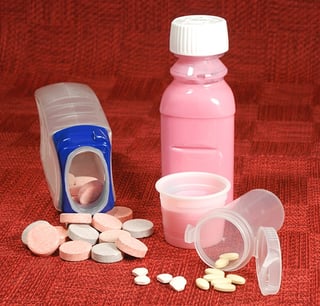Do you suffer from heartburn?
Learn important information about PPIs

Proton pump inhibitors (PPIs): What you need to know
If you’re one of the millions of Americans that suffer from heartburn, proton pump inhibitors (PPIs) may seem like your only treatment option. Many ads on TV or in magazines promote them and encourage you to use them. But most people do not need to take a PPI, and long-term use of these drugs can cause other medical issues. Hospitality Rx wants to make sure you have all the information you need to decide if a PPI is right for you.

What are PPIs?
PPIs are medicines that decrease the amount of acid your stomach makes. These pills help prevent heartburn and let your esophagus heal. You can get PPIs over-the-counter or through a prescription from your doctor.
| Your PPI options | |||
| Prescription | Over the counter | ||
| Brand | Generic | Brand | Generic |
| Nexium | esomeprazole | Nexium 24-hour | esomeprazole |
| Prevacid | lansoprazole | Prevacid 24-hour | lansoprazole |
| Prilosec | omeprazole | Prilosec OTC | omeprazole |
| Aciphex | rabeprazole |
Zegerid OTC |
omeprazole and sodium bicarbonate |
| Dexilant | dexlansoprazole | ||
| Protonix | pantoprazole | ||
Why am I taking a PPI?
PPIs are used treat several gastric disorders, including:
- Heartburn – a painful burning feeling in your chest or throat;
- Peptic ulcers – a sore in the lining of your stomach or your duodenum (the first part of your small intestine);
- Gastroesophageal reflux (GERD) – an illness that causes the contents of your stomach to backflow into your esophagus – symptoms can include heartburn, dry cough, and trouble swallowing;
- Gastrointestinal bleeds – when you are bleeding in your digestive tract;
- Helicobacter Pylori (H. pylori) – a stomach illness caused by bacteria;
- Zollinger-Ellison syndrome – a rare illness that happens when tumors form in your pancreas or duodenum; and
- Barrett’s esophagitis – an illness that happens when the lining of your esophagus is damaged by stomach acid.
Do I need a PPI?
Maybe. Not everyone who suffers from heartburn needs a PPI. If you have heartburn but have not been diagnosed with GERD, you can try over-the-counter antacids (Maalox, Mylanta, or Rolaids) OR H2 blockers (Zantac, Pepcid, or Axid). These medicines also decrease the amount of acid in your stomach. The Food and Drug administration (FDA) recommends that you only use these products for 2 weeks. If you continue to have heartburn after 2 weeks of treatment, then please see your doctor.
Are there risks if I use a PPI for more than 6 months?
Yes. PPIs can decrease your absorption of vitamins and minerals (calcium, B12, iron, magnesium). They can also increase your risk for bone fractures, pneumonia, enteric infections, Clostridium difficile-associated diarrhea, and the formation of gastric polyps.
Do antacids and H2 receptor blockers have the same risks?
No! These drugs decrease stomach acid in a different way than PPIs do. So they don’t have the same long-term risks.
What should I do next?
Talk to your doctor to see if a PPI is right for you or if a different, safer medicine may treat your illness. If you do need long-term treatment for GERD, use PPIs or H2 receptor blockers at the lowest dose needed to treat your illness.
The content on the Hospitality Rx website is not intended to be a substitute for medical advice, diagnosis, or treatment. Always seek the advice of your own physician or other qualified health care professional about any medical questions or conditions.
Sources:
- Culpepper, B., Galdo, J., O’Neill, L. Long-Term Consequences of Chronic Proton Pump Inhibitor use. US Pharm. 2013; 38(12):38-42
- Wolfe M. Overview and comparison of proton pump inhibitors for the treatment of acid-related disorders. In: Basow DW, ed. UpToDate. Waltham, MA: UpToDate; 2013
- FDA Drug Safety Communication: Possible increased risk of fractures of the hip, wrist, and spine with the use of proton pump inhibitors. FDA. March 28, 2011. www.fda.gov/drugs/drugsafety/postmarketdrugsafetyinformationforpatientsandproviders/ucm213206.htm Accessed May 4, 2016
- FDA Drug Safety Communication: Low magnesium levels can be associated with long-term use of proton pump inhibitor drugs (PPIs). FDA. March 14, 2011. www.fda.gov/drugs/drugsafety/ucm245011.htm. Accessed May 4, 2016.
- Proton pump inhibitors (PPIs)—drug safety communication: Clostridium difficile-associated diarrhea (CDAD) can be associated with stomach acid drugs. FDA. www.fda.gov/safety/medwatch/safetyinformation/safetyalertsforhumanmedicalproducts/ucm290838.htm. Accessed May 4, 16.
- Thomson A, Sauve M, Kassam N, Kamitakahara. Safety of the long-term use of proton pump inhibitors. World J Gastroenterol. 2010;16(19):2323-30.
- Five Things Physicians and Patients Should Question. American Gastroenterological Association: Choosing Wisely. April 4, 2012. http://www.choosingwisely.org/societies/american-gastroenterological-association/. Accessed May 5, 2016.
